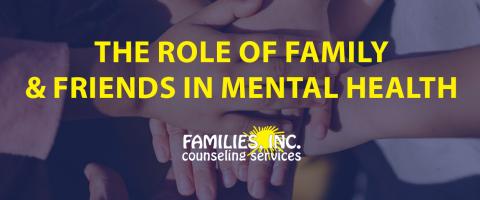
When the going gets tough, we all need someone to lean on. Nurturing and maintaining healthy relationships with those close to us is integral to long-term mental wellness. Mothers, brothers, sons, friends, coworkers, and everything in between all play a significant role in how we feel on a regular basis.
Family Matters
We’ve all heard some version of it before – “friends and lovers may come and go, but family is forever.” Call it cliched or contrived, but there’s no way around the fact that your family is the same flesh and blood. They’re often the people that have the closest eye on the challenges you are facing.
Past, Present, Future
Family dynamics play an outsized role in an individual’s mental health, both in the present moment and far into the future. Parents and siblings help to develop a child’s moral compass and general strategies for interfacing with the world. We all carry formative experiences and impressions from early years into adulthood that are largely defined by relationships with family members.
Good and bad habits, interpersonal skills, the way we see ourselves, and many more important characteristics are often direct results of familial relationships in developmental years. On one side, fond memories in which a child feels loved and seen can help to bolster their sense of self-worth throughout life. On the other, negative experiences can be carried as various degrees of emotional trauma that severely affect mental health in adulthood.
Foster Open Communication and Understanding
Promoting an atmosphere of open communication and understanding within a family can work wonders for everyone’s mental health. Developing strategies to keep up with how your children, siblings, or even parents are doing is an important first step. Good news: it’s easier than you think.
Simply setting a few minutes aside on a regular basis to check in and say, “Hey, how are you doing?” is a great way to open up a dialogue. Many people dealing with stress, anxiety, depression, and other mental ailments won’t go out of their way to talk about what they’re going through.
Taking the initiative and asking them to share their feelings is a great way to demonstrate that you care. Oftentimes, just listening about what went wrong and right in someone’s day can help them unload a great weight from their shoulders. Try to lend an open ear without judgment and actively listen to what the person is saying. This entails keeping phones down and TVs off to eliminate outside interferences.
I Get By With a Little Help From My Friends
Close friends are our chosen family. They are often tuned in to when we’re not feeling quite right and can help prop us up when we need extra support. For many, a close friend is easier to talk to about sensitive topics than a parent. Being able to air out issues with someone who understands you well is a great way to alleviate feelings of depression, anxiety, stress, and other woes.
As with family members dealing with mental health issues, it’s very helpful to create an open and encouraging space to vent. Similarly, engaging in physical exercise, playing games, creating art, and doing other activities together with friends are great ways to develop healthy coping mechanisms.
All Hands On Deck
When we’re sailing through rough waters, it’s comforting to know that there’s someone there to help us navigate the waves.
A Harvard study that spanned 85 years sought to get to the bottom of what makes people happy through life. It wasn’t a successful career, diet or exercise that came out on top (though these are often contributing factors). They found that the most significant influence on long-term happiness is the positive relationships that we maintain.
Family and friends provide the social support that we need to thrive and be our best selves. Whether you or a loved one are struggling with mental health, sharing about the experience can be incredibly helpful for all involved.
In some cases, the best way forward is to seek the counsel of a mental health professional. If you or a loved one are experiencing symptoms of depression, anxiety, or any other mental health disorders, consider speaking to a therapist or related expert.
Our friendly and compassionate mental health experts at Families, Inc are here to help. Give us a call or visit us at one of our 11 local clinics in Arkansas. Together, we can help you enjoy a healthier, happier life.


